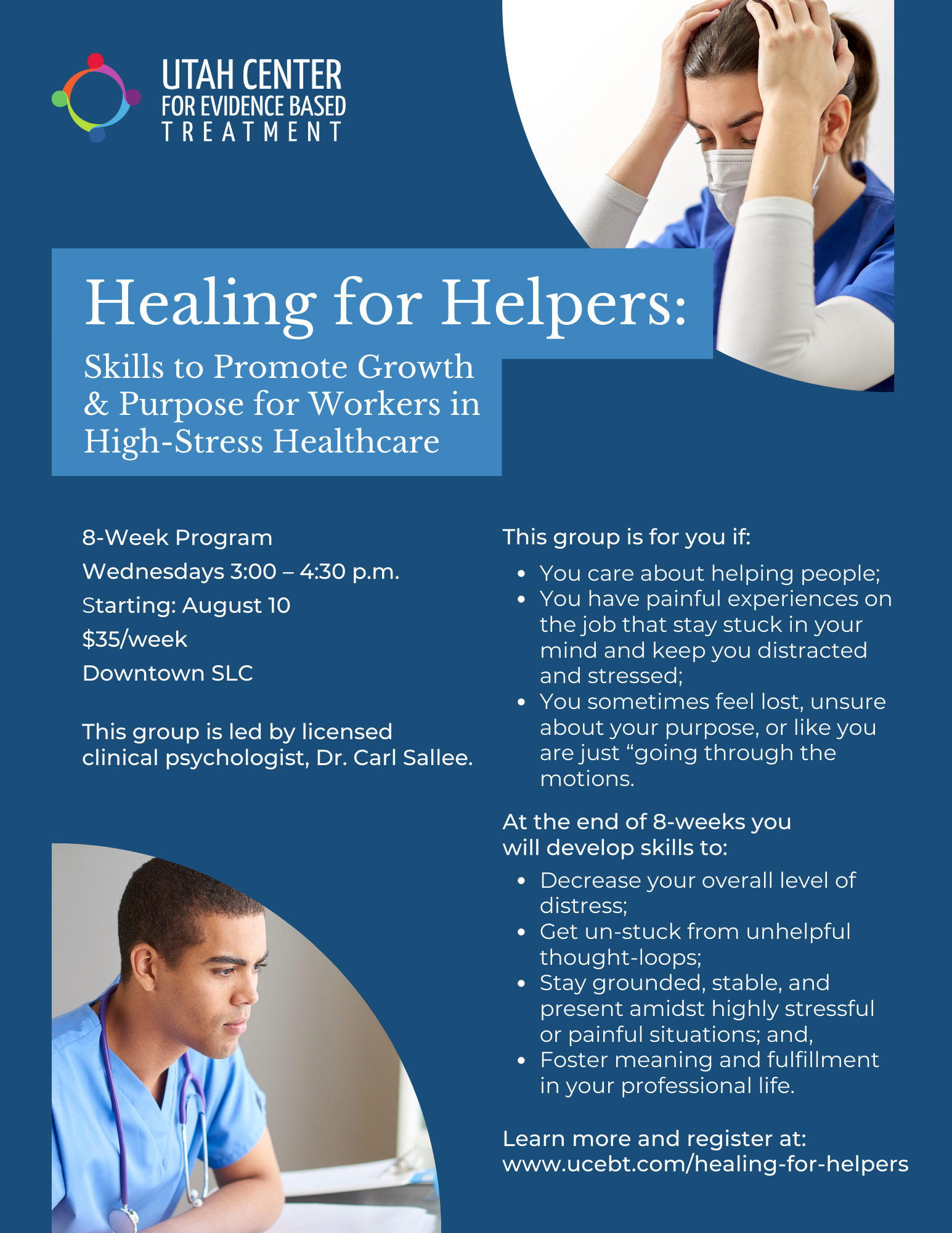Healing for Helpers: Skills to Promote Growth and Purpose for Workers in High-Stress Healthcare
What: Group for learning psychological skills
Duration: 8-weeks
When: Tuesdays, 5:30 p.m. to 7:00 p.m., starting September 6, 2022
Where: Virtual or In-Person; Utah Center for Evidence Based Treatment, 170 South 1000 East Suite 201, Salt Lake City, Utah
Price: $35/week
Classes taught by: Dr. Carl Sallee, Licensed Clinical Psychologist
REGISTER HERE: https://forms.office.com/r/p6xsLNRNz4
This group is for you if any of the following resonate with your experience:
- You are in a healthcare profession because you care about any of the following things: helping people, being someone who facilitates healing, being a compassionate person, being an empathic person, advocating for vulnerable/sick/hurting people, learning about humanity through science/discovery, or any other significant guiding value/moral.
- You experience high stress situations/events on the job that are very difficult to manage because they cause strong painful emotions and they tend to stick in your mind even when you don’t want to be thinking about them so often. OR, if you haven’t experienced something like this, because of the nature of your job, you wouldn’t be surprised if you do experience something like this in the future.
- You care about being the best possible version of yourself both on and off the job, but you find it very difficult to do so because showing up to work or life involves feeling strong and painful emotions on a regular basis.
- You frequently find yourself stuck in your own head, which can be distracting and distressing at times.
- You are in a healthcare profession but you sometimes feel lost, unsure about your purpose, or like you are just “going through the motions.”
At the end of 8 weeks, you will:
- Develop skills to foster meaning and fulfillment in your professional life through clarifying the values that motivate you and identifying creative and flexible ways to whole-heartedly pursue these values even in the face of barriers, stress, or painful emotions.
- Learn evidence-based skills that help you stay mindfully grounded, stable, and present amidst highly stressful situations, such that the painful emotions involved do not overwhelm you or throw you off course.
- Learn evidence-based skills that help you get un-stuck from thought loops and ruminations that are unhelpful when it comes to your ability to stay engaged in what matters most to you in life.
- Develop a deeper level of self-compassion that will ultimately also help you be more effective at showing compassion and care for the people you serve in your job.
- Decrease your overall level of distress because you will learn skills to effectively move through the expected stressors of your job in a way that helps you grow, rather than exacerbates the initial stress.
REGISTER HERE: https://forms.office.com/r/p6xsLNRNz4
The research:
This group primarily uses an evidence-based therapy called Acceptance and Commitment Therapy (ACT).
Research findings showed ACT led to reduced workplace burnout through fostering self-compassion, mindfulness, and values as mediators. Skills in ACT that build self-compassion, mindfulness, and clarity about one’s values were connected to lower mental weariness, which is connected to less workplace burnout:
Prudenzi A, Graham CD, Flaxman PE, Wilding S, Day F, O’Connor DB (2022) A workplace Acceptance and Commitment Therapy (ACT) intervention for improving healthcare staff psychological distress: A randomised controlled trial. PLoS ONE 17(4): e0266357. https://doi.org/10.1371/journal.pone.0266357
ACT has also been shown to reduce psychological distress for folks working in direct client care healthcare positions, who have a high baseline level of distress about their work:
Reeve, A., Tickle, A. and Moghaddam, N. (2018), "Are acceptance and commitment therapy-based interventions effective for reducing burnout in direct-care staff? A systematic review and meta-analysis", Mental Health Review Journal, Vol. 23 No. 3, pp. 131-155. https://doi.org/10.1108/MHRJ-11-2017-0052
Increasing psychological flexibility through ACT intervention has evidence for decreasing overall work-related distress:
Flaxman, & Bond, F. W. (2010). A randomised worksite comparison of acceptance and commitment therapy and stress inoculation training. Behaviour Research and Therapy, 48(8), 816–820. https://doi.org/10.1016/j.brat.2010.05.004
Studies support that emotional acceptance skills (which are taught in this group) are connected to lowered physical and mental/emotional panic symptoms during acute states of stress;
Longitudinal research suggests that low emotional acceptance skill are connected to higher degrees of psychological distress in long-term follow-up after going through highly negative events. Conversely, high skill in emotional acceptance correlated to a significant decrease in PTSD symptoms for Veterans, regardless of combat exposure. Put in simple terms, evidence suggests that one of the core skills taught in this ACT group, acceptance of painful emotions, leads to less psychological impairment following stressful events;
Willingness to feel painful emotions during and after high stress situations has been identified as an adaptive coping process that helps people adjust after the situation, rather than staying stuck in high distress after the situation is over; and,
In populations with high risk for developing depression, studies show that a high level of emotional acceptance (as a learned skill or baseline trait) is a protective factor against developing depression:
Shallcross, A. J., Troy, A. S., Boland, M., & Mauss, I. B. (2010). Let it be: Accepting negative emotional experiences predicts decreased negative affect and depressive symptoms. Behaviour Research and Therapy, 48(9), 921–929. https://doi-org.georgefox.idm.oclc.org/10.1016/j.brat.2010.05.025
REGISTER HERE: https://forms.office.com/r/p6xsLNRNz4



